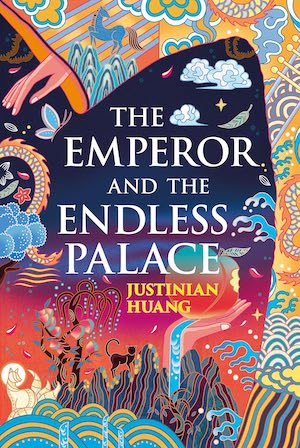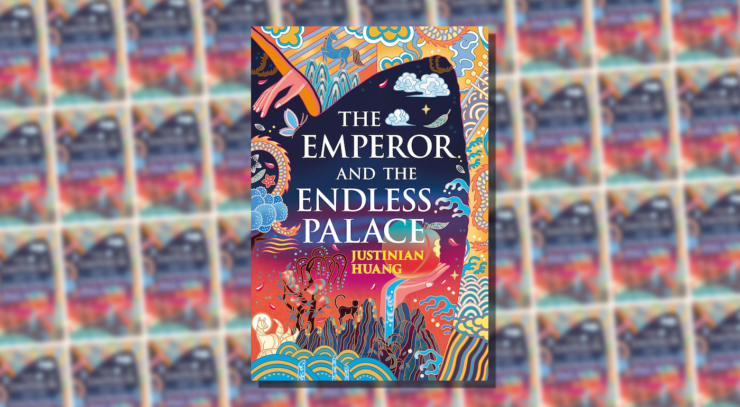4 BCE China, the palace of the Emperor of the Han Dynasty.
1740 China, a wayside inn by a forest.
Modern day LA, glamorous, fabulous circuit parties.
In each setting, two men impossibly drawn to each other, wondering why they feel so strongly, so surely about each other.
What if what they are feeling, this inexplicable love and attraction, is a “feeling of metaphysical recognition, when your soul remembers someone from a previous life?” The Emperor and the Endless Palace asks the question, “how would that change the way you look at each stranger, knowing that they could be the epic romance across all of your lifetimes?”
Justinian Huang’s remarkably self-assured debut novel is a fantastic trip across centuries, a romp through grand palaces and lush forests and pulsating cities; the story of an everlasting connection between two souls bound to each other at every reincarnation, the story of obsession, betrayal and endless epic love. Two men are fated to be reborn into similar roles, destined to find one another, destined to always hunger and pine for one another, destined to always find each other, love each other, destroy each other; destined also make the same mistakes again and again and again.
In 4 BCE China, we meet Dong Xian, a clerk in the imperial palace who is trying to navigate his way to a position of more importance, not knowing that the Emperor’s grandmother, the Machiavellian Grand Empress Dowager Fu has her sights set on him for her own schemes. In 18th Century China, we meet Hi Shican, an innkeeper who is drawn to a nine tailed fox spirit under the guise of a mysterious young man named Jiulang, who needs help with something dangerous, help that Hi Shican cannot deny because of their immediate, inexplicable connection. In modern day Los Angeles, we meet River, a medical student who has only recently come out, and is experiencing L.A.’s gay party scene for the first time. He meets an artist from China who has somehow painted and sculpted River’s face dozens and dozens of times, though they have never met before. At least not in this lifetime.
Buy the Book


The Emperor and the Endless Palace
The novel presents these three distinct timelines, each with its own narrative arc, but with echoes between them. Each pair of characters has to traverse complications, treachery and dangers, but each pair also finds a true love and a deep understanding in each other.
Huang effortlessly moves between the timelines and narratives, creating a rich world for each set of characters with equal aplomb. The writing is cinematic (which would make sense given Huang’s background as a creative for Sony), extremely readable and often thrilling (thrills of all sorts—danger, sex, violence), though it would be safe to say that Huang is equally adept at turning poetic phrases when the need arises. A character “…stared straight ahead as he spoke quietly, each word like the first raindrops of an approaching storm”; another is a “beautiful mystery to the very end.”
There is plenty of sex, and most of it drives the plot along, rather than existing just for cheap thrills or titillation when the plot is flagging. Huang’s treatment of the sex scenes is clever and thoughtful, especially with regards to the language he uses to describe both body parts and action—characters in 4 BCE would not refer to their penises the same way as a young man in contemporary L.A. would, for example. Huang uses metaphors that were common place in China at the time (peach, plum, influence), and while that may come across as purple prose to some, it is all entirely relevant to the setting and is historically accurate. And as much as Huang is unabashed about graphic sex, there are some poignant moments in those scenes too, such as one character describing the experience “…[moving] to an ancient rhythm between men.”
A great deal of The Emperor and the Endless Palace stems from actual history. Dowager Fu, Emperor Ai and Dong Xian are all real historical figures from the Han Dynasty, with the Emperor and his lover’s story (called “the passion of the cut sleeve”) being known as an affair that brought down an entire Dynasty. Hi Shican and Jiulang’s relationship is known from a short story considered to be an early narrative on homosexuality in China, which refers to the “cut sleeve,” a phrase that echoes the story of Emperor Ai. River’s story is probably familiar to many young Asian gay men who, upon coming out, may have searched for a community within a culture that isn’t always ready to openly celebrate them. Queer awakening, heartbreak, heritage, joy and fear all feature in the rich emotional landscape of the novel, reminding us of how much is just sheer human experience, no matter when and where.
The Emperor and the Endless Palace is a celebration of being queer, being Asian, being both. The novel honours Asian queerness through the ages and proclaims loudly, proudly that the stories of Asian gay men, and their queer spaces are relevant and important. Huang wants to remind people that queerness has always been a part of Asian culture, that (as he recently said in an interview) “queer Asian folk are the protagonists of our own epic stories.”










